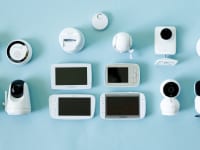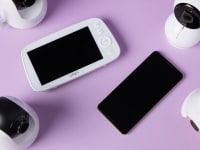When should you stop using a baby monitor?
When is it time to ditch the extra eyes and ears on your child?
Products are chosen independently by our editors. Purchases made through our links may earn us a commission.
It’s a piece of technology many new parents can’t live without: a baby monitor.
Providing much-needed piece of mind, baby monitors include a camera and microphone to keep an eye (and ear) on your baby or toddler when they’re alone in their nursery or bedroom—and with many models supporting an app for parents to also check in when away from home. Some however are audio-only models that will simply transmit the sounds they pick up from a nursery or bedroom.
While it's a handy device for when they’re little, there comes a point when you don’t need to rely on a baby monitor any longer.
So, when is it time to stop using a baby monitor?
The answer, it seems, is hinged on a few variables.
How to tell when it’s time to stop using a baby monitor?
Dr. Edmond Sarraf, a renowned and seasoned pediatrician with the Southern California Integrative Wellness Center in Los Angeles, says the average age for parents to stop using a baby monitor is between 2 and 4 years old.
“There are two major things I look for here: sleep hygiene and language,” explains Sarraf—who goes by “Dr. Ed”—in a telephone call with Reviewed.
“If you look at the first year of life, they’re growing really fast, and they don’t know how to communicate very well,” begins Sarraf. “Between 12 and 18 months, they often have disrupted sleep, separation and stranger anxiety [not ideal for babysitters] and speak few words.”
“But vocabulary starts to flourish at about 2 years old, when they start to put a few words together, as well,” adds Sarraf. “And so, on average, at about two-and-a-half we may give them their own beds, they’re sleeping better, and so we may see parents stop [using baby monitors] around this time.”
At 3 years old they’re saying phrases, communicating very well, and at four years old they can very clearly articulate their needs—and so there’s a huge shift in modality, continues Sarraf. “Since they’re likely in their own beds by now they can come in and out and get you if something is bothering them.”
This is just a general guideline, of course, and only parents can gauge if their child’s sleep and language has developed enough to stop monitoring them. “At our practice it’s important we respect each individual child, and their developmental milestones, as unique.”
Andrea Scalzo Yi, parenting expert and founder of the Raising Dragons educational media company, confirms that deciding on when to stop using a baby monitor is “a very personal decision.”
“For me, once my kids were around 18 months I stopped using [a monitor] at night,” shares Yi, the mother of four boys (now ages 7 through 14). “At that point, I was comfortable that I would wake up and hear the crying from my room and I didn't want to hear every little sound.”
Yi, who authored 100 Easy STEAM Activities and Super Simple Science Experiments For Curious Kids, concedes they’d “still continue to use the monitor for nap times when we were farther away from the bedroom or I would turn it on from time to time to check on my kids when I needed to see them—but in terms of keeping the monitor on all night, that ended much earlier.”
What if moms and dads can’t get a good sleep?
How well parents sleep may also factor into your decision: “I also became a very light sleeper after having kids and I found the monitor would wake me up every time the baby made a sound and once I turned it off at night I started sleeping better,” says Yi. “I would still wake up if the baby cried, but not for every little noise.”
Yi acknowledges we’re “so fortunate to have access to these types of technologies” as they give us a certain level of comfort, but she thinks having the monitor on all the time and hearing every little sound can impede a parent’s ability to get a good night's sleep.
“Parents should start phasing out the monitor once they're comfortable with knowing their child's patterns and needs” summarizes Yi, whose company Raising Dragons creates short videos featuring simple science experiments, educational toys, challenging math games and creative craft projects that keep kids having fun while growing and learning.
Developmentally delayed children, other variables
In the industry for more than 20 years, Dr. Sarraf says parents can discuss stopping monitor use at night with a pediatrician, if they’re not sure.
“Some kids start really early, they can put together words at a year-and-a-half and sleep well, and have a lot of independence, but on the flipside maybe you have an autistic child or neurodiverse child, which is now 1 in 8 kids, by the way, and so this [decision] may be delayed a little bit,” says Sarraf. “Kids may be hurting themselves, if they can’t self-soothe, and so, again, you have to individualize this, which is why I proposed a range.”
Your environment may also sway your decision one way or another. “For example, you may live in a mansion and can’t hear your kids without a monitor,” adds Sarraf.
Yi mirrors Sarraf’s sentiment: “If the child's room is out of earshot of the parent's room, then they may want to consider extended use.”
Are baby monitors necessary for parents?
“Generally speaking, I think parents tend to leave the monitor on longer than they need to,” says Yi. “I know by the time I had my fourth son, I was using the monitor much less than with my first son…I was more comfortable in my abilities as a parent and I knew I would be able to hear him if he needed me.”
Fear may also play a role. “Parents often turn to ‘Dr. Google’ [online searches] to look up something they’re concerned about, which may put them in ‘fear mode,’” adds Dr. Sarraf, “and so maybe they err on the side of caution,” and wind up keeping a baby monitor longer than they may necessarily need to.


